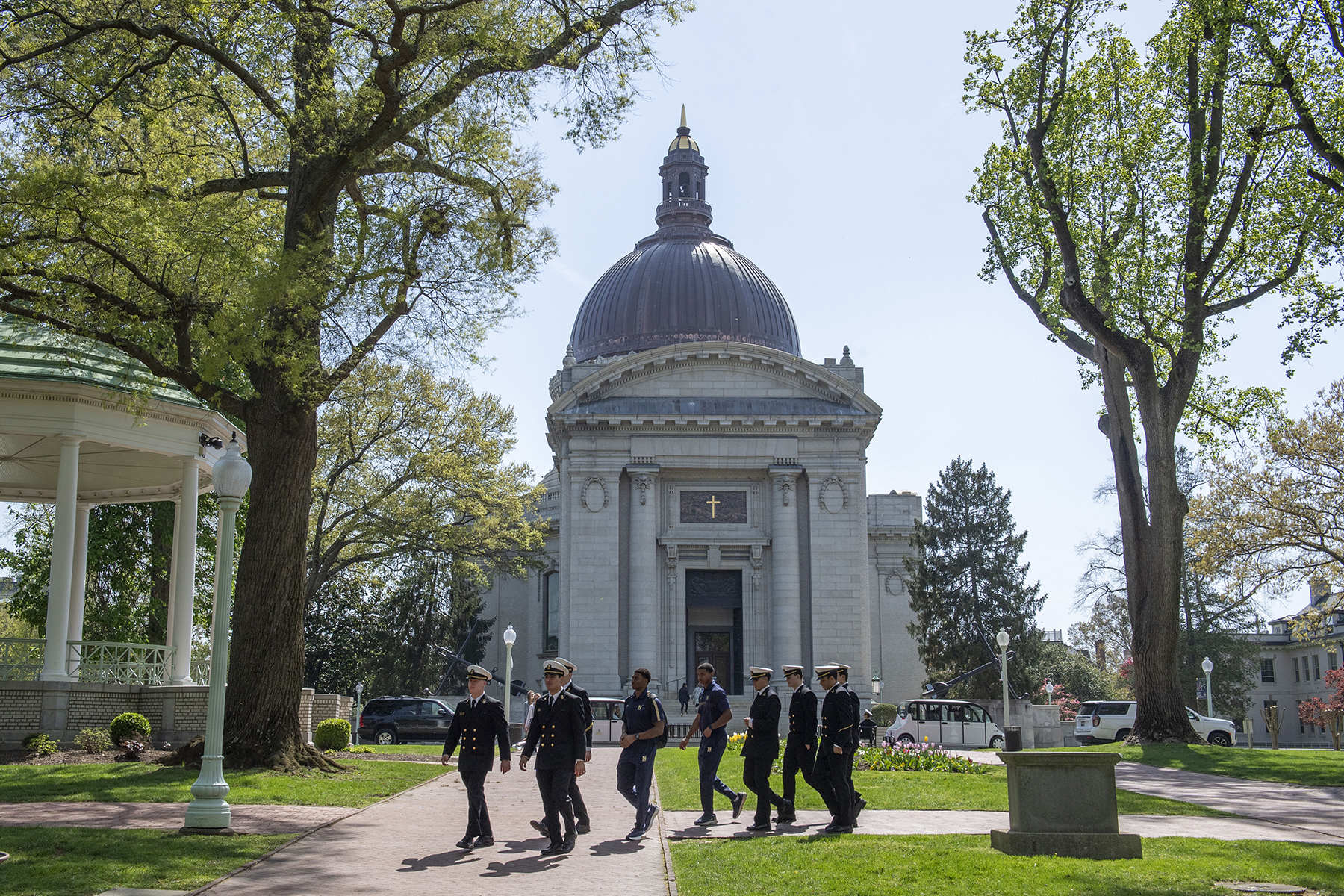When the U.S. Naval Academy stripped 381 books tied to diversity, equity and inclusion (DEI) from its library, retired Commander William Marks saw more than censorship — he saw a threat to the Navy’s future. But last week, after immense public outcry, most of those books returned to Nimitz Library shelves.
“Do you believe it?” asked Marks, a 1996 alum who spearheaded a campaign to maintain student access to the books. “What great news. We’re thrilled.”
All the books the academy removed in early April had one thing in common: Officials flagged them for DEI themes. They include Maya Angelou’s “I Know Why the Caged Bird Sings,” Harper Lee’s “To Kill a Mockingbird” and Elizabeth Reis’ “Bodies in Doubt: An American History of Intersex.” The purge followed directives from Trump-appointed Defense Secretary Pete Hegseth, who has called DEI initiatives “divisive.”
Determined to ensure that students could still read the works, Marks began crowdfunding to replace them on April 5.
“The motto of the Naval Academy is ‘from knowledge, seapower,’” said Marks, who served as a Navy commander for 22 years. “What we mean is without knowledge, education and intellectual growth, we will never become a strong Navy. So this contradiction really struck me, that instead of encouraging knowledge and encouraging discussion, the Pentagon was actually suppressing knowledge and limiting discussion.”
About 4,400 students, members of the Brigade of Midshipmen, attend the Naval Academy while on active duty in the U.S. Navy. After graduation, they are required to serve in the Navy or Marine Corps for at least five years. Women represent more than a quarter of the student body, while men make up over 70 percent of midshipmen.
Initially, Marks hoped to fundraise $3,810, which he figured would be enough to cover the cost of the books pulled from Nimitz Library. Since Marks lives in Arlington, Texas, he tapped Old Fox Books & Coffeehouse in Annapolis, Maryland, home to the academy, to be his local partner.
Donations have far exceeded his goal, topping $70,000.
Jinny Amundson, an owner of Old Fox Books, said by the time she got the call from Marks, she had already heard about the books removed and had started compiling a list of them to purchase for the store’s inventory.
“For a bookseller, the idea of censoring any kind of books just gives us heart palpitations,” Amundson said. “And it’s our community. The [midshipmen] think of our shop as a place that they love and one of their sort of unofficial bookstores. We have the mids, the faculty, the administration that come in and think of our space as their own.”
Amundson said she understood that the removal of books was an order, which has to be followed within the military. But she found the loophole: Her bookshop could store the titles targeted. It is conveniently located about a block away from the Naval Academy gates.
The day before the institution’s May 23 graduation, Amundson learned that most of the pulled books were back on the library’s shelves. She went to see for herself, took pictures of the books and sent them to many of the authors, who had personally contacted her when the restrictions on the works took effect.

Now, just 20 books are being sequestered pending a formal compliance review, according to the Department of Defense. A Navy spokesperson did not provide details to The 19th about those titles. Ultimately, a narrowing of the search terms used to flag books for review resulted in the return of hundreds of books to the Nimitz Library, as the Department of Defense first issued broad guidance about book removals to the military services.
“What struck me was the very arbitrary and even cruel nature of the books that got removed,” Marks said. “These books were a cross-section of American culture. They were important to the discussion of American history.”
In an updated May 9 memo, the Pentagon instructed the military services to use 20 search terms to pinpoint books in their academic libraries that might need to be set aside because of how they engage race or gender. Among those terms were affirmative action; critical race theory; gender-affirming care; transgender people; and diversity, equity and inclusion.
People across the political spectrum expressed alarm about the book restrictions, which have been widely opposed, according to Marks. “We really shouldn’t be banning any books,” he said. That includes those with unpopular, or even offensive, ideas like Adolf Hitler’s “Mein Kampf,” which managed to evade the Naval Academy’s book purge, he noted.
He calls his effort to maintain the midshipmen’s access to all books in the Nimitz Library Operation Caged Bird, after the 1969 Angelou memoir that was likely targeted because it describes racial segregation and child abuse.
The name Operation Caged Bird also alludes to the feeling of being restrained by censorship. “I almost felt like I could feel the bars closing in on me in terms of what I can read and can’t read,” Marks said. “That didn’t sit right.”
Marks’ GoFundMe campaign has raised enough money to supply 1,000 books in 2025 and fund a three-year initiative at Old Fox, ensuring midshipmen can access any contested title for free.
“If you’re a midshipman and you’re writing an essay paper and there’s a book you can’t find, maybe it’s been removed or banned, you can call them, and they’ll order it for you, and then you just pick it up free of charge,” Marks said. He’s also coordinating with other service academies, anticipating similar battles.
At the Navy’s three other educational institutions, fewer than 20 books have been flagged as potentially incompatible with the military’s mission, as have a few dozen at the Air Force Academy and other Air Force academic institutions. The Army has also been ordered to assess library books at its educational institutions, but a spokesperson from West Point told The 19th that no books have been pulled at this time, as its compliance review is still underway.
The return of nearly 400 books to the Naval Academy library coincides with a pending lawsuit accusing Department of Defense-run schools of violating K-12 students’ constitutional rights for limiting books and subject matter related to gender, race and sexuality. The American Civil Liberties Union filed E.K. v. Department of Defense Education Activity in the U.S. District Court for the Eastern District of Virginia on behalf of 12 students. A hearing will take place June 3. The ACLU seeks a preliminary injunction to give the youth access to materials it argues have been restricted to align with President Donald Trump’s executive orders and political agenda.
Amundson said she was pleasantly surprised that it took just weeks for the books to be returned to the Naval Academy.
“I believe that what happened and the response that was given in Annapolis — I think that made the administration be much more careful this time around as they’re going for these other libraries, the other Department of Defense libraries around the world,” she said.
Amundson said using the funds raised from the GoFundMe campaign, the bookstore was able to give away nearly 500 books in the days leading up to the Naval Academy graduation. For weeks, letters of support piled up and people stopped by the bookstore with gratitude, some even driving from hours away to show their support in person.
In addition to Operation Caged Bird, Amundson said there were “powerful arms at work.” There was pushback on the book removals from members of Congress, the Naval Academy’s Board of Visitors and the superintendent — who wrote an open letter signed by hundreds of alumni.
“For right now, this was a huge win for us,” Amundson said.





